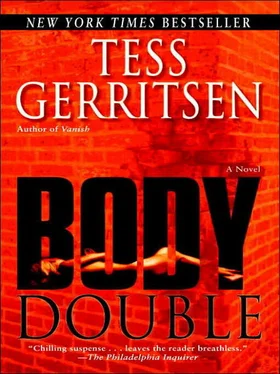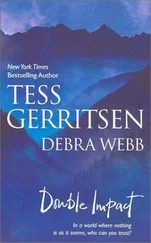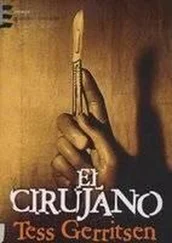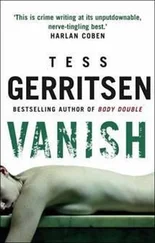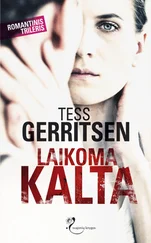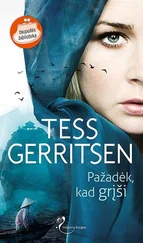“You make it sound like indentured servitude.”
“It’s my job. It’s what I’m good at.”
“Not, in itself, a reason to do it. So why do you?”
“Why are you a priest?”
Now it was his turn to look perplexed. He thought about it for a moment, standing very still beside her, the blueness of his eyes muted in the shadows cast by the willow trees. “I made that choice so long ago,” he said, “I don’t think about it much anymore. Or question it.”
“You must have believed.”
“I still believe.”
“Isn’t that enough?”
“Do you really think that faith is all that’s required?”
“No, of course not.” She turned and began walking again, along a path dappled with sunlight and shade. Afraid to meet his gaze, afraid that he’d see too much in hers.
“Sometimes it’s good to come face-to-face with your own mortality,” he said. “It makes us reconsider our lives.”
“I’d rather not.”
“Why?”
“I’m not big on introspection. I grew so impatient with philosophy classes. All those questions without answers. But physics and chemistry, I could understand. They were comforting to me because they taught principles that are reproducible and orderly.” She paused to watch a young woman on Rollerblades skate past, pushing a baby in a stroller. “I don’t like the unexplainable.”
“Yes, I know. You always want your mathematical equations solved. That’s why you’re having such a hard time with that woman’s murder.”
“It’s a question without an answer. The sort of thing I hate.”
She sank onto a wooden bench facing the river. Daylight was fading, and the water flowed black in the thickening shadows. He too sat down, and although they didn’t touch, she was so aware of him, sitting close beside her, that she could almost feel his heat against her bare arm.
“Have you heard any more about the case from Detective Rizzoli?”
“She hasn’t exactly been keeping me in the loop.”
“Would you expect her to?”
“As a cop, no. She wouldn’t.”
“And as a friend?”
“That’s just it, I thought we were friends. But she’s told me so little.”
“You can’t blame her. The victim was found outside your house. She has to wonder-”
“What, that I’m a suspect?”
“Or that you were the intended target. It’s what we all thought that night. That it was you in that car.” He stared across the river. “You said you can’t stop thinking about the autopsy. Well, I can’t stop thinking about that night, standing in your street with all those police cars. I couldn’t believe any of it was happening. I refused to believe.”
They both fell silent. Before them flowed a river of dark water, and behind them, a river of cars.
She asked, suddenly: “Will you have dinner with me tonight?”
He didn’t answer for a moment, and his hesitation made her flush with embarrassment. What a foolish question. She wanted to take it back, to replay the last sixty seconds. How much better to have just said good-bye and walked away. Instead, she’d blurted out that ill-considered invitation, one that they both knew he shouldn’t accept.
“I’m sorry,” she murmured. “I guess it’s not such a good-”
”Yes,” he said. “I’d like to very much.”
She stood in her kitchen dicing tomatoes for the salad, her hand jittery as it gripped the knife. On the stove simmered a pot of coq au vin, wafting out steam fragrant with the scents of red wine and chicken. An easy, familiar meal that she could cook without consulting a recipe, without having to stop and think about it. She could not cope with any meal more complicated. Her mind was completely focused on the man who was now pouring two glasses of pinot noir.
He placed one glass beside her on the counter. “What else can I do?”
“Not a thing.”
“Make the salad dressing? Wash lettuce?”
“I didn’t invite you here to make you work. I just thought you’d prefer this to a restaurant, where it’s so public.”
“You must be tired of always being in the public’s eye,” he said.
“I was thinking more about you.”
“Even priests eat out at restaurants, Maura.”
“No, I meant…” She felt herself flush and renewed her efforts with the tomato.
“I guess it would make people wonder,” he said. “If they saw us out together.” He watched her for a moment, and the only sound was her knife blade rapping against the cutting board. What does one do with a priest in the kitchen? she wondered. Ask him to bless the food? No other man could make her feel so uneasy, so human and flawed. And what are your flaws, Daniel? she wondered as she slid the diced tomatoes into a salad bowl, as she tossed them with olive oil and balsamic vinegar. Does that white collar give you immunity to temptation?
“At least let me slice that cucumber,” he said.
“You really can’t relax, can you?”
“I’m not good at sitting idle while others work.”
She laughed. “Join the club.”
“Would that be the club for hopeless workaholics? Because I’m a charter member.” He pulled a knife from the wooden block and began to slice the cucumber, releasing its fresh, summery fragrance. “It comes from having to help out with five brothers and a sister.”
“Seven of you in the family? My god.”
“I’m sure that’s what my dad said every time he heard there was another one on the way.”
“So where were you in that seven?”
“Number four. Smack in the middle. Which, according to psychologists, makes me a natural born mediator. The one always trying to keep the peace.” He glanced up at her with a smile. “It also means I know how to get in and out of the shower really fast.”
“And how do you go from sibling number four to being a priest?”
He looked back down at the cutting board. “As you might expect, a long story.”
“One you don’t want to talk about?”
“My reasons will probably strike you as illogical.”
“Well, it’s funny how our biggest decisions in life are usually the least logical. The person we choose to marry, for instance.” She took a sip of wine and set the glass back down. “I certainly couldn’t defend my own marriage on the basis of logic.”
He glanced up. “Lust?”
“That would be the operative word. That’s how I made the biggest mistake of my life. So far, that is.” She took another sip of wine. And you could be my next big mistake. If God wanted us to behave, He shouldn’t have created temptation.
He slid the sliced cucumbers into the salad bowl and rinsed the knife. She watched him standing at the sink, his back to her. He had the tall, lean build of a long-distance runner. Why do I put myself through this? she wondered. Of all the men I could be attracted to, why does it have to be this one?
“You asked why I chose the priesthood,” he said.
“Why did you?”
He turned to look at her. “My sister had leukemia.”
Startled, she didn’t know what to say. Nothing seemed appropriate.
“Sophie was six years old,” he said. “The youngest one in the family, and the only girl.” He reached for a dish towel to dry his hands, and neatly hung it back on the rack, taking his time, as though he needed to measure his next words. “It was acute lymphocytic leukemia. I suppose you could call it the good kind, if there’s any such thing as a good leukemia.”
“It’s the one with the best prognosis in children. An eighty percent survival rate.” A true statement, but she was sorry the instant after she’d said it. The logical Dr. Isles, responding to tragedy with her usual helpful facts and heartless statistics. It was the way she’d always coped with the messy emotions of those around her, by retreating into her scientist’s role. A friend just died of lung cancer? A relative left quadriplegic from a car accident? For every tragedy she could cite a statistic, drawing reassurance in the crisp certainty of numbers. In the belief that behind every horror, there is an explanation.
Читать дальше
